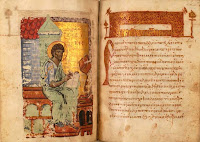Maundy Thursday: Luke 23:1-25
 Accusations laced with irony. Indecisive leadership. A desire to abdicate responsibility. A hankering for spectacle and ridicule; governance made frivolous. An unholy alliance of hedonism and power farcically pushing the true King around like a puppet. A miscarriage of justice. An exchange, egged on by rebels (not just spiritually but literally). "Surrendered Jesus to their will" - so who is in charge? Pilate? The crowd? Or God?
Accusations laced with irony. Indecisive leadership. A desire to abdicate responsibility. A hankering for spectacle and ridicule; governance made frivolous. An unholy alliance of hedonism and power farcically pushing the true King around like a puppet. A miscarriage of justice. An exchange, egged on by rebels (not just spiritually but literally). "Surrendered Jesus to their will" - so who is in charge? Pilate? The crowd? Or God?For Jesus willingly came to seek and save the lost (Luke 19:10), identifying himself as the Suffering Servant -
"he poured out his life unto death,
and was numbered with the transgressors.
For he bore the sin of many,
and made intercession for the transgressors." (Isaiah 53:12; Luke 22:37)
and also as the Ascended Son of Man (Luke 22:69), proclaiming that He is indeed, the King of the world.
BIBLE READING: Luke 23:1-25
Then the whole assembly rose and led him off to Pilate. And they began to accuse him, saying, "We have found this man subverting our nation. He opposes payment of taxes to Caesar and claims to be Christ,a king."
So Pilate asked Jesus, "Are you the king of the Jews?" "Yes, it is as you say," Jesus replied.
Then Pilate announced to the chief priests and the crowd, "I find no basis for a charge against this man."
But they insisted, "He stirs up the people all over Judea by his teaching. He started in Galilee and has come all the way here."
On hearing this, Pilate asked if the man was a Galilean. When he learned that Jesus was under Herod's jurisdiction, he sent him to Herod, who was also in Jerusalem at that time.
When Herod saw Jesus, he was greatly pleased, because for a long time he had been wanting to see him. From what he had heard about him, he hoped to see him perform some miracle. He plied him with many questions, but Jesus gave him no answer. The chief priests and the teachers of the law were standing there, vehemently accusing him. Then Herod and his soldiers ridiculed and mocked him. Dressing him in an elegant robe, they sent him back to Pilate. That day Herod and Pilate became friends—before this they had been enemies.
Pilate called together the chief priests, the rulers and the people, and said to them, "You brought me this man as one who was inciting the people to rebellion. I have examined him in your presence and have found no basis for your charges against him. Neither has Herod, for he sent him back to us; as you can see, he has done nothing to deserve death. Therefore, I will punish him and then release him."
With one voice they cried out, "Away with this man! Release Barabbas to us!"(Barabbas had been thrown into prison for an insurrection in the city, and for murder.)
Wanting to release Jesus, Pilate appealed to them again. But they kept shouting, "Crucify him! Crucify him!"
For the third time he spoke to them: "Why? What crime has this man committed? I have found in him no grounds for the death penalty. Therefore I will have him punished and then release him."
But with loud shouts they insistently demanded that he be crucified, and their shouts prevailed. So Pilate decided to grant their demand. He released the man who had been thrown into prison for insurrection and murder, the one they asked for, and surrendered Jesus to their will.
Labels: Bible reading












Post a Comment
<< Home